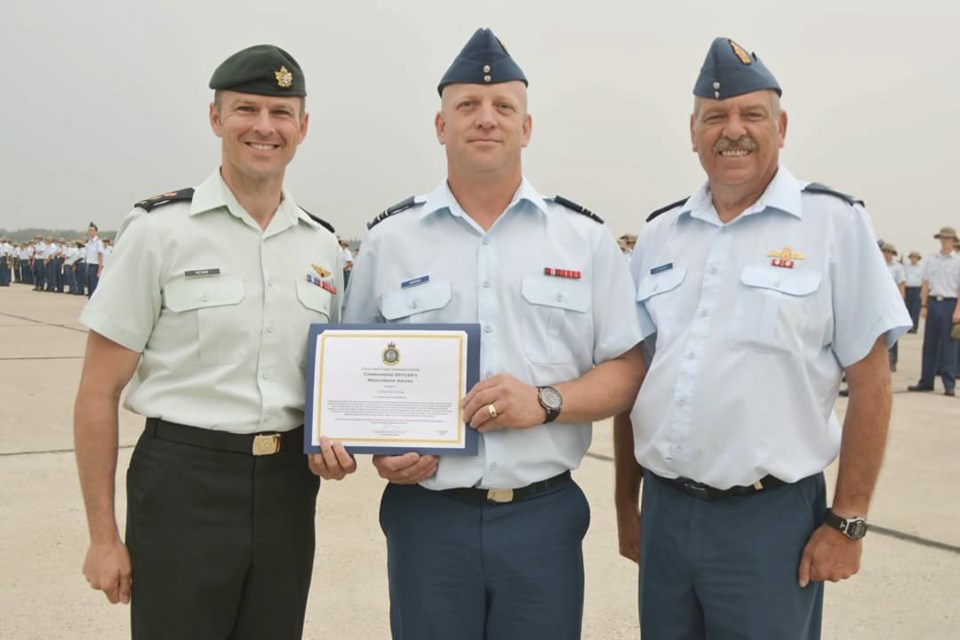If there’s anything that makes getting aging worthwhile, it’s the opportunity to share experiences and expertise with younger generations. That’s how Capt. Reid Habing, commanding officer of the 187 Foothills Air Cadet Squadron, feels when he works with young cadets. This summer, while on staff at the Cold Lake Cadet Training Centre (CTC) where skill-building camps are held for cadets of all ages, Habing was honoured with the CO’s Mentorship Award. “It was pretty awesome to be recognized that way,” said Habing. “I remember being a young officer and cadet myself and I relied on my mentors a lot, so to be able to say I’m one of the mentors now is a pretty cool feeling. “It actually feels good to feel older at that point. Normally you don’t want to feel old, but this is a good reason, to have that experience.” His award was based on the time he took to guide staff cadets and young officers at the CTC. When he saw young leaders struggling he stepped in and gave advice. In one case, a young warrant officer who had a lot of experience with cadets didn’t have as much expertise in survival training. Habing took him out into the woods to teach him some skills and how to lead cadets through their training. “I just said, ‘Okay kid, let’s go out in the bush and I’m going to give you some street credit. You can show these kids you don’t have to be a survival god to be a leader,’” said Habing. “So I taught him some skills and some styles and it was really good.” Survival is something Habing has always enjoyed. In fact, his main job at the CTC this summer was to teach general training cadets, ages 12 and 13, their basic survival training. During general training the cadets are given a crash course in something different each day, from music to survival or shooting range. The following year, they will choose an area to specialize in, he said. He enjoys teaching survival skills so much, Habing volunteered his time during his weeks off over the summer to help with basic survival cadets and instructors. “It’s fun, and they could always use help,” he said. Besides, it’s one of his favourite parts of the cadet program. Habing said he likes seeing how creativity can come out of necessity when people are faced with a problem to solve in the wild without conventional tools. It could be that there’s no hatchet and they have to learn how to use their knife as a hatchet instead, he said. One of the skills he taught this summer was how to build a hammer. “We made sledgehammers out of deadfall,” said Habing. “If you pick the right piece of wood and cut the ends off to make it straight and do a proper lashing – boom. And the kids are amazed by that. “Then you get the creative juices going and you should see the stuff they come up with.” There’s no limit to the creativity that goes into survival, which is one reason he enjoys it so much. The other is how it encourages teamwork, because survival is a lot more difficult on your own, he said. “It’s kind of like regular drill, you do it as a team,” said Habing. “This is my parade square, out in the bush.” When he wasn’t working on survival, Habing was working with staff cadets and officers on briefings and classes, and how to perform evaluations or interviews with cadets. Teaching and having a positive influence on the lives of young cadets is what keeps him coming back. “When you get the chance to see these kids grow and develop and become these leaders and young adults, it’s pretty cool,” said Habing. “That’s the biggest addiction to the program, is if you can help these kids.” He may occasionally think about stepping down after “just one more year,” but seeing the impact he makes on cadets’ lives keeps Habing returning to the 187 Foothills year after year, eager for another 10 months of leading parade and working with youth. There are plenty of benefits to being involved in the program, he said, but the greatest one is the appreciation that comes from the cadets themselves. When they walk up to Habing to shake his hand and thank him at the end of the year, or introduce their parents or grandparents, that makes everything worthwhile, he said. “There’s a lot of work to it, I won’t deny that, but the greatest gift I can get is a kid who was grateful I was there, who’s just happier I was there,” said Habing. “They don’t have to think I’m the best, but if they think, ‘I’m glad he was there,’ that makes it all worth it.”




